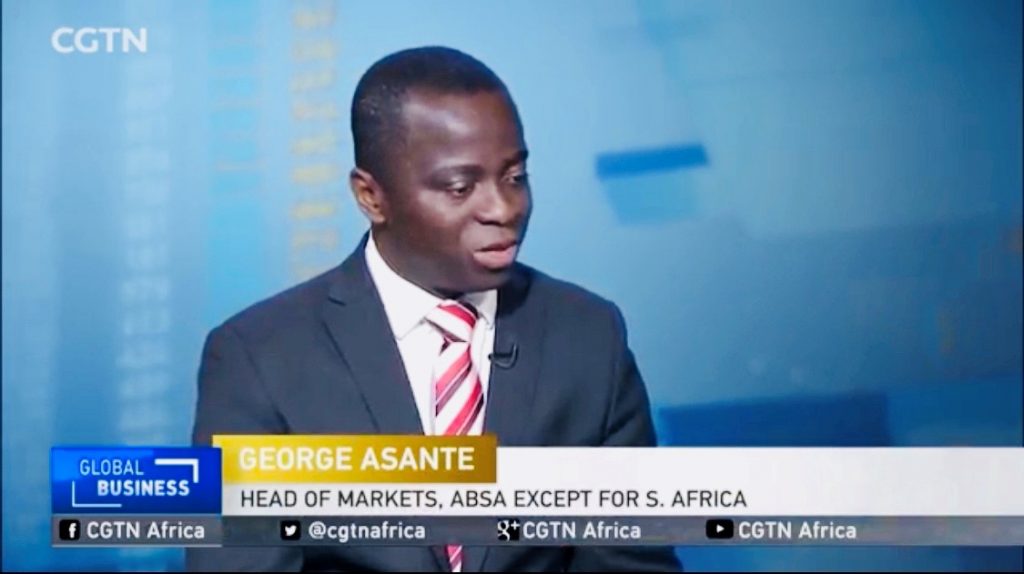Kenya’s capital markets have improved in the second edition of the Absa African Financial Markets Index. It’s been ranked 3rd among the 20 countries surveyed. South Africa was ranked first, with Ethiopia, rounding out the list. The 2018 edition of the report pointed to weak participation levels by local retail and institutional investors as an impediment to the development of capital markets in most markets. The report came out on the same day when the International Monetary Fund also pointed out that the Kenyan Shilling was about 17% overvalued. Below is a conversation between CTGN Africa and Mr. George Asante who is the ABSA Africa Head of Markets (ex. SA).
CTGN Africa: There’s a shortage of investment vehicles tailored to investors needs and they say that it forces over investment in specific asset classes such as treasury bills and bonds. What exactly do they want to see? (CTGN Africa)
GA: One of the key things as a pension fund manager one would be thinking about is the ability to outperform a risk free benchmark. And that talks to the ability to get access to corporate debt market which will normally pay some basis point about where the government securities are. What we have seen in the Kenyan markets is that not enough of those assets are available for pension funds to be able to invest in. So almost every pension fund manager is then compelled to go to the risk free market where they acquire instruments and performance tracks a risk free yield. The other part has to do with the biggest risk to any pension fund manager, which is the ability to manage inflation or to be able to pay liabilities by matching inflation yields or inflation performance over time. What you also find is that in the Kenyan markets there is no asset that particularly tracks inflation and it leaves a gap from a pension fund managers perspective. There are also instances where as a pension fund manager you may see a risk on the local currency vis-a-vis the dollar so you may want some exposure to a dollar asset and that is also limited in the Kenyan market.
CTGN Africa: Is it that the pension fund trustees don’t understand the available assets that they can invest in or is it that there is simply no pressure on them to deliver?
GA: Firstly it has to do with the culture that one is familiar with. Today we are familiar with the treasuries that are always available so people would be more comfortable investing in that. That is the mandate that asset managers are getting from trustees i.e. be conservative. There needs to be a shift from that conservative culture to go into instruments that will diversify risk.
Secondly there are benchmarks that are set by trustees for asset managers. Most of these benchmarks are around the ability to perform up to the risk free level.
CTGN Africa: The tax policy in which we act for security is also limited and sometimes uncertain. This uncertainty is something policy fund managers are always complaining about. Is that a valid complaint?
GA: It is valid. The first point we need to recognize from a Kenyan perspective is that it is in competition. So when it comes to investment flows into the continent, they race with Nigeria, Tanzania, Uganda and South Africa. Investors look around and check where it is easy for them to invest. When they look around Kenya and Nigeria and see that the latter doesn’t charge anything in terms of tax but Kenya does. As such they move their money to Nigeria. There is an element of competition in the ability to benchmark yourself to competition.
The other part that deals with clarity is the processes to recover taxes when paid. What we have seen is that countries like Nigeria come up with clear rules and a lot of Double Taxation Agreements – DTAs. This enables asset managers to recover their taxes. For Kenya to position itself as a competitive market, it either deals with removal of taxes or if there are taxes then have clarity in process in terms of recovery of money.
CTGN Africa: Do you agree with the IMF’s perspective?
GA: I think the IMF is entitled to their view. From our perspective the way we look at it is whether currency is managed or is it floating. It is really not something the investors normally look at. What they look at is consistency. If you have managed consistently throughout and they should be able to anticipate what you will do which is what goes into their evaluation. What we have found is that Kenya has a deep foreign exchange market and that can be put to good use. It is about certainty and ability to bring money in and clearly take money out.

